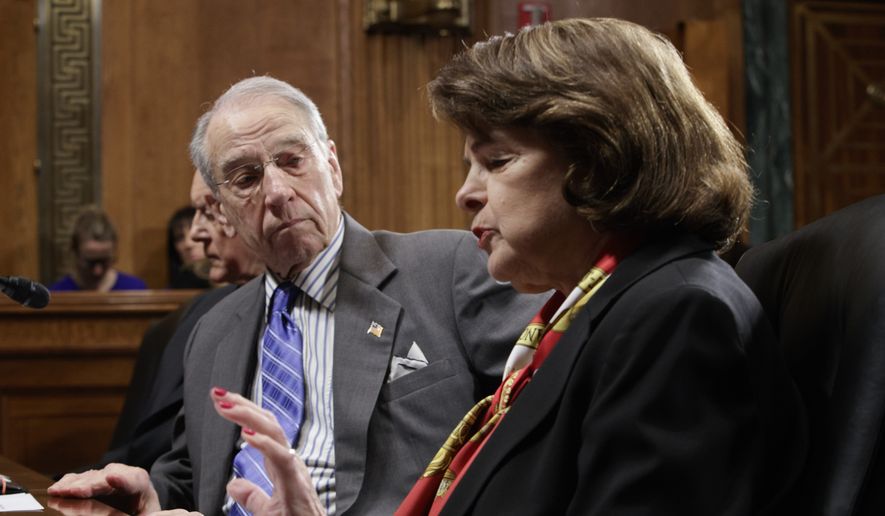The White House hasn’t found support for its effort to freeze out Democrats’ oversight requests among Republicans — who remember all too well the difficulties they faced as the minority party trying to pry information from the Obama administration.
Several prominent Republican leaders have lashed out in recent days after the Trump administration reportedly directed federal agencies to ignore requests for information from Democrats and offered withering criticism of a recent legal opinion from the Justice Department that appears to give the White House legal cover to do so.
Last week, Republican leaders recounted their difficulties as the minority party in Congress in getting the Obama Justice Department to divulge facts about Fast and Furious, the botched gun-walking operation of the Bureau of Alcohol, Tobacco, Firearms and Explosives.
Sen. Chuck Grassley, the Iowa Republican who pressed for the congressional investigation into the operation, highlighted the delays he faced getting information about the case when he testified last week before the House Oversight and Government Reform Committee and advocated for legislative changes to ensure that members of the executive branch “cannot rely on phony privilege claims and delay tactics” to avoid responding to congressional inquiries.
“Sometimes you are in the majority and sometimes you are in the minority, and there is a process that has to be available,” Mr. Grassley said.
Reflecting on the struggles Mr. Grassley encountered at the time, Rep. Darrell E. Issa, California Republican, likened them to the problems Democrats are facing today.
“Apparently, many don’t understand that you were in the minority and they were seeking not to in fact cooperate,” Mr. Issa said. “I believe the minority should be heard and reasonably answered.”
Rep. Jason Chaffetz, Utah Republican and chairman of the House oversight committee, shared that sentiment.
“The Department of Justice is taking a position that they should only respond to chairmen. I think that is a dangerous and unsustainable policy,” Mr. Chaffetz said.
The Justice Department’s office of legal counsel issued an opinion last month that drew widespread rebuke from Democrats, who said it would hamper Congress’ ability to conduct oversight.
“Individual members of Congress, including ranking minority members, do not have the authority to conduct oversight in the absence of a specific delegation by a full house, committee, or subcommittee,” read the opinion, written by Curtis Gannon, the acting assistant attorney general for the office of legal counsel. “They may request information from the Executive Branch, which may respond at its discretion, but such requests do not trigger any obligation to accommodate congressional needs and are not legally enforceable through a subpoena or contempt proceedings.”
Meanwhile, the White House has told agencies not to respond to requests for information unless they come from a committee chairman, but Republicans control both houses of Congress and therefore the committee chairmanships.
House Minority Leader Nancy Pelosi, California Democrat, spoke out against the legal opinion last week, calling it an attempt by the president “to hide the truth from the American people.”
“With this order, President Trump is making his disregard for transparency and his lack of respect for Congress’ oversight role crystal clear,” said Mrs. Pelosi. “Since Day One, the administration has refused to respond to hundreds of requests from Democrats on a range of issues critical to the health and security of the American people.”
The legal opinion states that a letter or inquiry from members of Congress who do not chair relevant committees are “not properly considered an ’oversight’ request.” As a result, such inquiry “does not trigger any obligation to accommodate congressional needs and is not legally enforceable through a subpoena or contempt proceedings.”
After speaking out against the opinion last week, Mr. Grassley wrote to President Trump on Friday asking him to rescind the Justice Department opinion.
“Oversight brings transparency, and transparency brings accountability,” he wrote. “And, the opposite is true. Shutting down oversight requests doesn’t drain the swamp, Mr. President. It floods the swamp.”
Not every agency appears to be following the White House directive to shut down requests that come from individual members of Congress rather than committee chairmen.
Homeland Security Secretary John F. Kelly testified last week before a House committee that he is trying to improve the department’s bad reputation for failure to respond to congressional inquiries.
“I think every senator I talked to in office calls, beats me up very, very brutally about the fact that my department was among the worst in the federal government to responding to congressional inquiries,” Mr. Kelly said.
To help streamline the workload of responding to information requests, Mr. Kelly said, he would prefer that such questions go through a committee. He said the department won’t hesitate to answer any congressional inquiry, though he acknowledged that it could take time because of the number of requests and the often broad scope of information sought.
“The point is, on the congressional inquiries, my folks are leaning forward on this,” said Mr. Kelly, “So what we will always do is either call your staff or frequently write a letter back saying, ’You know, we got the request, it’s going to take us some time, it’s a huge request and just bear with us but we’ll get back to you.’”
• Andrea Noble can be reached at anoble@washingtontimes.com.




Please read our comment policy before commenting.